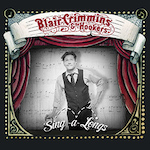|
10/31/13: Pocket pool For the longest time, I resisted pop music. My early childhood music consisted of show tunes, instrumental movie soundtracks and similar stuff. I listened to baseball games and CBS Mystery Theater on the radio. I know, right about now you're smacking your head saying "This explains everything!" And you're right. I spent my first twelve years largely outside the influence of popular music. Then my family moved to New Mexico. And I had two choices on the radio: Country or pop. And, duh, pop it was.
At the time, it was well-received, but over the years Tug of War has climbed the charts of "great albums." As it should. Remarkably, despite the massive amount of craft put into the songs (McCartney and Martin back together again; I can only imagine the studio time involved), the album itself moves along briskly. You can quibble with the merits of "Ebony and Ivory" (it sounded much better in 1982, I swear), but the whole album stays in pocket. So I was stoked when Pipes of Peace hit the stores a couple of years later. In hindsight, I should have recognized that my slight hesitation when I first heard "Say Say Say" (the duet with Michael Jackson that served as "payback" for the glorious "The Girl Is Mine" on Thriller) meant that Pipes was not up to the task of following Tug of War. And wow. It was a colossal disappointment. If I ever listened to that album all the way through, it was just the first time. I don't think I did, however. I remember pausing on the flip to try and work out my angst before soldiering on. Didn't work. Pipes is a borderline awful album. I didn't understand. How could the guy who created the brilliant Tug of War (and a Beatle, besides!) come right back with something so terrible? In many ways, that question is what has driven my writing about music. I've spent more than twenty years trying to explain how it is that one album sounds so naturally awesome and another sounds like a Tinkertoy contraption about to collapse. I can give you all sorts of technical reasons, but largely it boils down to staying in pocket. "The pocket" in music is like "the zone" in sports. You know it when you hear it. Geniuses seem to locate and stay in pocket longer, but it is still something of a mystical concept. In any case, the difference between good and bad often comes down to how well an artist stayed in pocket. In short, music that stays in pocket sounds effortless, as if sprung into the air by virtue of its innate irrepressibility. The great albums all have this feeling of inevitability. But to make a great album, you must have a series of songs that not only stay in pocket--they have to stay in the same pocket. Not easy at all. There are genres that resist the concept of the pocket. Prog (and its extended family) actively scoffs at the notion of an all-powerful pocket, preferring to rely on steely technical prowess (and a good blaster). This is why prog's popularity will always be limited. Other genres rely almost exclusively on the pocket. Americana, in particular, rises or falls depending on the condition of the pocket. Once the songs start sounding like assembled parts, the magic is gone. Blair Crimmins and the Hookers play a specific brand of americana that insists on wink and a promise. It's more old-timey than folky, with its roots firmly planted in Dixieland jazz and Tin Pan Alley. There are double-entendres galore (almost as many musical as lyrical) and a general good-timey feel. After a few seconds, it's clear that this album will succeed as long as Crimmins and company don't bog themselves down with silly concepts like artistic purity and slavish devotion to influences. In other words, if this album veers even slightly from the modestly crude mania suggested by the first track's title ("Roll Over Bessie"), then it will fail. Thankfully, everyone simply has a good time. The songs roll by with a cheerful leer. The musicians never let up off the throttle, which gives these songs an irrepressible energy. I suppose there are those who might tire of puns and slightly off-color metaphors, but that sort of silly humor pairs perfectly with this impeccably squonky music. Or, in other words, Crimmins found the pocket and sat down in it. There's not a dull moment in this album (the 11 songs clock in at just past 35 minutes). Crimmins is more than willing to wallow in his slightly seedy world, and we get to bask in the afterglow. Lovely. He's My Brother She's My Sister (no punctuation, apparently) hail from the rock and roll side of americana. To be more precise, the band works the americana side of indie pop. The sound is much more stripped down and relies on some lovely lead guitar work to really shine. But the pocket is established quickly here as well, and HMBSMS drives uptempo beats, some lovely guitar work and a loose vocal style to stay the course nicely. There's no way to escape this album without a smile. Whether channeling rockabilly, folk rock, California country rock, Big Star-ish ameranglo pop or whatever, HMBSMS tears the cover off the songs. Eyes closed, it's easy to imagine this band in the living room. There a real feel of spontaneous generation here, even if science long ago discredited that theory. If you have any doubts, crank up the fourth track ("Same Old Ground") and hear how the band gives late 60s Stonesey rock an enema and ends up with a gem. I think I've listened to that song 50 times, and I still can't wait to hear it again. In the end, I suppose that all a given review ought to say whether or not an artist hit the pocket and stayed there. That would make my job a lot simpler--if it didn't eliminate my job entirely. Whatever the words, however, Blair Crimmins and the Hookers and He's My Brother She's My Sister have found the sweet spot (even if it's impossible to say the same about their unwieldy names). Tonight I'm smiling.
|
|
return to A&A home page

